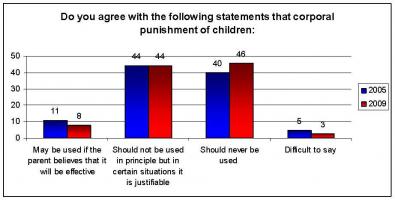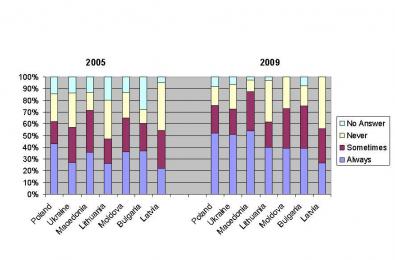Studies parallel to
the studies from 2005 were conducted this year in the frame of the
Childhood without Abuse Project. The aim of the studies was to assess changes in the level of public's and professionals' awareness on the topic of child abuse that took place during the time of the project implementation. Studies were conducted in all seven countries participating in the project: Bulgaria, Lithuania, Latvia, Macedonia, Moldova, Poland, and Ukraine.
The studies sought answers to the following research questions:
• How do the respondents estimate the scale of a wide range of abusive behaviours?
• How do they evaluate the dynamics of various aspects of child abuse?
• What is the level of social acceptance of controlling parents' behaviours toward their children?
• What are the respondents' self-reported attitudes toward parental use of corporal punishment of children?
• How do they evaluate various professional groups' sensitivity and competence in the area of child protection?
They included two elements:
- Two Omnibus questions asked to a nationwide, representative sample of adults:
What percentage of children in our country experience corporal punishment (or beating as punishment) in their families?
In your opinion, is beating a child as punishment a childrearing method, which:
1) may be used whenever the parent believes it is going to be effective
2) should not be used in general, but is justified in some situations
3) should never be used
4) it's difficult to say
- A survey of teachers' attitudes toward child abuse. The same schools as in 2006 were chosen. The teachers in the selected schools were asked to fill in self-administered questionnaire consisting of 87 items, which had been previously used in Polish research programmes concerning child abuse (Sajkowska, Siemaszko, 1998; Fluderska, Sajkowska, 2001). Apart from assessing teachers' attitudes toward the problem of child abuse, the questionnaire measured professionals' experience in undertaking interventions in such cases and their evaluation of the effectiveness of the child protection system in their countries.
The table below shows comparison of the summary results of the public's attitudes research (Omnibus study) in all 7 countries done in 2005 and 2009. Significantly more persons are now convinced that physical punishment of children should never be used. At the same time less respondents thought that parents have the right to use corporal punishment even if they believe in its effectiveness.
Next table indicates answers gave by the teachers in East European countries to the following question: In cases of child abuse that you have encountered in the past year, did you take any actions?
Generally in all countries professionals became more inclined to take intervention in cases of child abuse. At the same time number of teachers not having point of view on this matter grew significantly smaller, what can be understood as an effect of raised awareness of the problem and ways to deal with it.
Below you can download research reports in English





